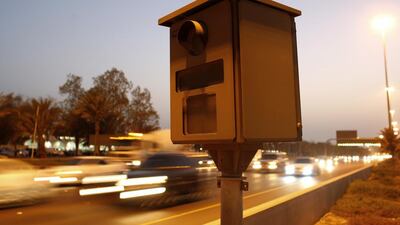ABU DHABI // Programmable radar traffic cameras will go live on the streets of Abu Dhabi by the end of the year, a police roads expert said on Tuesday.
“All our radar cameras will be adaptable and will control enforcement from our smart traffic centre, but we are waiting for the variable message signs to be ready,” said Dr Atef Garib, a roads and traffic adviser at Abu Dhabi Police. “It’s already available in town but we are not implementing it yet.”
A variable message sign notifies drivers of speed limit changes according to conditions.
Once the electronic signs are deployed, police can install the radar cameras and enforce a change in speed limit according to road conditions, he said.
Dr Garib spoke during the Smart Traffic Middle East Conference, which featured case studies of management systems around the world.
“Face-to-face enforcement is very effective and it’s one of our key performance indicators,” he said. “We found in the last four to five years that it was one of the most effective. We don’t penalise, we provide information and awareness, then we penalise them for their traffic violations.” Dr Garib also outlined the various ways real time information – “big data” – has helped to improve road safety in the emirate.
Road fatalities decreased by 40 per cent, while pedestrian fatalities dropped by 35 per cent between 2009 and 2014. At the same time, the number of vehicles on the emirate’s roads rose from 601,208 in 2009 to 947,508 in 2014, he said.
Transportation is one of the biggest generators of big data. Real time statistics are generated from on-board sensors, traffic counters, speed cameras, smart phones and traffic violations.
The police have six pillars to improve traffic safety – enforcement, education, engineering, emergency response, engagement and evaluation.
“We use big data for enforcement by monitoring aggressive drivers and distribution of radars; education by designing of awareness programmes, engineering for incident detection, truck re-routing and traffic diversion, and emergency response for patrol allocation,” he said. “For engagement, we have 100 traffic safety ambassadors to spread traffic safety awareness to the community.”
Abu Dhabi’s vision is to reach zero traffic fatalities by 2030.
“Most of the states in the US and European countries are working towards Vision Zero,” Dr Garib said. “We have the facilities, the data, the trust of the Government – so why not work towards that goal? As you see, Abu Dhabi is going in the right direction.”
rruiz@thenational.ae

